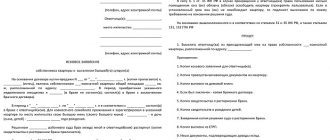How to sign a person out of an apartment and is it possible to sign him out without consent?
Is it possible to discharge a person without his consent ? As long as there is a procedure for mandatory registration of citizens at their place of residence, conflicts and problems arising around issues of registration and deregistration are inevitable. Registration is the main reason for living in the premises, as well as the right to participate in privatization. The basic principle of registration and deregistration is the voluntary desire or consent of the citizen. But there are cases when a conflict of interest arises and a desire to discharge a person who does not agree to this. The legislation lists all permissible grounds for such actions.
How to discharge a person from an apartment without his consent and what grounds should be there for this? You can discharge a person from an apartment without his consent through the court.
All legal grounds that are necessary for discharge are given in Article 7 of the Law of the Russian Federation of June 25, 1993 N 5242-1 “On the right of citizens of the Russian Federation to freedom of movement, choice of place of stay and residence within the Russian Federation.” This law is devoted to the rights of citizens of the Russian Federation to free movement, determination of place of residence on the territory of the Russian Federation, Article 7 lists the reasons why citizens can be deregistered at a certain place of residence.
Eviction from the premises or denial of the right to use housing is possible only on the basis of a court decision that entered into force at the time of its actual execution. There is only one possibility for forced eviction - discharge through the court. There are no other methods that do not violate the law.
To go to court you must:
- have convincing grounds for the impossibility of further registration of the defendant in the specified area;
- draw up a statement of claim
- confirm with documents your rights to housing and the grounds for eviction of the defendant.
This is also important to know:
What documents will be required to formalize a deed of gift for an apartment?
Having received the court decision in your hands, you can contact the Federal Migration Service and submit an application to write it out through the court.
Despite the complexity of the procedure, there is judicial practice. Every day, courts make positive or negative decisions on issues of forced eviction. Most often, issues regarding the discharge of an ex-husband are considered, since in most cases the owners of the property are women.
Extract from your roommate's apartment
A relative can be deregistered without his consent only through the court. Is it possible to write out a cohabitant, for example, a common-law husband or wife, if in fact he/she is not a relative? Here, too, not everything is so simple.
Even if a person is not a relative of the owner of the apartment, then without his consent the owner will not be able to remove him from the registration register without going to court.
But before filing a statement of claim for the forced eviction of a cohabitant, the apartment owner must try to resolve the issue peacefully.
To do this, he needs to write a notice demanding the eviction of the cohabitant, indicating the grounds for making such a decision . The notice must be drawn up in two copies, one of which the apartment owner gives to the cohabitant, and the second one he keeps for himself.
On the copy that remains with the owner, the cohabitant must put a mark indicating that he has read the text of the notice. If a person refuses to put such a mark, then the owner of the apartment must hand him the document in front of witnesses, or send it by registered mail with acknowledgment of receipt.
If, after receiving the notification, the cohabitant still refuses to deregister, then the owner of the living space can go to court.
In this case, it is important to prove to the judge why you need to evict your roommate:
- he does not help pay for utilities, does not make repairs in the apartment;
- he has not lived in the apartment for a long time;
- uses the housing for other purposes (turned the apartment into a warehouse, office, etc.);
- he ruins the life of other residents or neighbors.
Conditions for removing a person from an apartment without his consent
There are several mandatory provisions on the basis of which you can begin the eviction procedure:
- The plaintiff must be the owner of the residential premises. In privatized or purchased housing, this is the owner. In non-privatized apartments, an application for deregistration is submitted on behalf of the municipal body in charge of the residential premises.
- The defendant is not the owner and has lost family relations with the owner (divorce), does not live in the premises for a long time, violates discipline or does not pay housing and communal services.
- The defendant cannot be a minor.
If there are sufficient grounds, it is necessary to correctly and consistently follow the eviction procedure:
- collect a package of documents;
- send a statement of claim to the court for an extract (a sample can be downloaded here);
- take part in the court hearing in person or through your representative with a power of attorney; transfer to the Federal Migration Service the received court decision, application for deregistration, passport and documents confirming property;
- hand over those received from the court (writ of execution) to the bailiff service at the location for the actual expulsion of the unwanted tenant from the apartment. According to Law No. 209-FZ, these actions are within their competence.
Son-in-law's discharge
A difficult situation with registration and deregistration arises when the mother-in-law, who is the owner of the apartment, the son-in-law and his wife, that is, the daughter of the owner of the living space, are registered in one apartment. Moreover, when a young couple gets divorced, the issue of discharging the son-in-law becomes relevant.
Is it possible to discharge a son-in-law without his consent if he divorced his wife? Yes, you can, and this rule is spelled out in paragraph 4 of Art. 31 of the Housing Code of the Russian Federation. It is noted there that in the event of termination of family relations, the right to use living space for the former family member is not retained.
But this does not mean that the landlady can discharge her son-in-law only on the grounds that he divorced his wife . To remove a negligent relative from the register, you still need to go to court with a claim for eviction, where you need to indicate that the reason for the eviction was a divorce.
A statement of claim submitted to the court along with other documents (an extract from the house register, a copy of the certificate of state registration of property rights, a receipt for payment of state duty) is usually considered for 2 months, after which the judge makes an appropriate decision.
If it was accepted in favor of the plaintiff, then the owner of the apartment must contact the migration service with an application to remove her son-in-law from the registration register.
If the former son-in-law refuses to leave the apartment even after the court makes a decision not in his favor, then the mother-in-law should contact the Bailiff Service for the forced eviction of the negligent relative. The bailiff, together with a representative of law enforcement agencies, will forcibly evict the former son-in-law from the apartment.
It is possible to discharge a registered husband, wife, daughter, son, son-in-law and other relatives from an apartment without their consent only through a judicial procedure.
To remove a person from the registration register, the plaintiff must provide arguments as to why there is a need to deregister the relative.
The reasons may be different: a person does not live in the apartment for a long time, does not help pay for utilities, uses the housing for other purposes, creates obstacles to the normal living of other residents in the apartment or neighbors.
Video: Can an apartment owner sign out a registered relative?
How to discharge from a privatized apartment
The housing issue remains problematic to this day. It is assumed that one family lives in each residential area, but relationships deteriorate, are destroyed, and people are still forced to live together. In these cases, the question often arises whether it is possible to discharge a person from an apartment without his consent.
If the initiative comes from the owner, then the answer is most likely to be positive. The final decision is made by the court. Therefore, to answer the question “can I expel a person from an apartment if I am the owner,” a consultation with a lawyer can help.
To independently understand the question of whether it is possible to discharge a person without his consent, the following prerequisites must exist:
- status of legal owner with an extract from the Unified State Register or other documents confirming receipt of ownership as a result of purchase, donation, inheritance, privatization;
- family relations with the evicted person have been terminated, there is a divorce document. Since according to Art. 292 of the Civil Code of the Russian Federation, only family members have the right to live with the owner in the same premises;
- it can be confirmed that the persons registered in the living space do not live there and have other housing or the means to rent it. Without consent, it is allowed to deregister a family member who is serving a prison term or is declared dead.
This is also important to know:
How to register ownership of an apartment and what documents are needed for this
To remove a non-owner from an apartment without consent, the procedure is carried out in the prescribed manner:
Free legal consultation
Free legal consultation We will answer your question in 5 minutes!
Ask a Question
We will answer your question in 5 minutes!
Ask a Question
- Court;
- FMS division;
- bailiffs.
Important
Sometimes a controversial situation arises, for example, we are not talking about spouses, but about adult children, grandchildren or parents. In this case, the question of whether the owner can write out a registered person will only be answered by consideration of the case in court.
Ex-spouse's statement
How to discharge a person from a privatized apartment if he is no longer part of the family? It is important to understand that during a divorce, the former spouse, if he is not the owner of the premises, automatically loses the right of residence. However, even here circumstances may arise that will not allow him to be so easily deprived of his housing. This is about:
- The apartment was purchased during the marriage, since in accordance with the Family Code it is community property, regardless of who earned money for it. Only the court can determine the future fate of the property, but the ex-spouse retains the right to live in it.
- If during their marriage the spouse invested money in repairs, significantly improving the quality of housing, and has the appropriate documents confirming this fact.
- If you have a share in the property.
- If the spouse has nowhere to live, he has no relatives, he is limited in health or opportunities, which does not allow him to provide himself with housing. In this case, the court may allow him to continue living in the apartment, and it will be impossible to discharge him without consent.
In other situations, when applying to the court, the former spouse will be discharged. Or you need to resolve this issue yourself, without bringing the matter to trial.
How to be discharged from a municipal apartment
Most of the housing stock today is owned by residents, but there is a category of municipal housing that has not been privatized to date. This group generates the most controversy.
In this case, the owner of the housing is the municipal authorities, and all residents are users who have received an apartment for rent. The legislation provides options on the basis of what and how a non-owner can be evicted from an apartment.
The following persons are subject to compulsory discharge:
- violating the rules of the hostel (disorderly conduct, hooliganism);
- worsening the condition of housing, for example, carrying out redevelopment that creates a danger to the building;
- using housing not as a place of residence, but for other purposes;
- those who have accumulated large debts for utility services; parents who have been deprived of parental rights and who do not have the right to live next to the child (Article 91 of the Housing Code of the Russian Federation).
The following procedure is provided for how to discharge a person from an apartment through the court:
- family members, neighbors, the board of guardians or other interested parties file a statement with the municipal authority about facts requiring the eviction of the tenants or one tenant;
- a local government representative draws up and sends a statement of claim; then the court decision and application for an extract (a sample can be downloaded here) are submitted to the Federal Migration Service.
How to check out from a donated apartment
A deed of gift is one of the most indisputable pieces of evidence confirming ownership. If the right to real estate belongs to one of the spouses on the basis of a gift agreement, the housing cannot be considered family property, and in the event of a divorce belongs only to its owner. Therefore, if the basis of ownership is a gift agreement, then the problem of “how to expel a person from an apartment without his consent if I am the owner” is resolved in favor of the owner. In this case, the owner can independently dispose of the property, including deregistering the non-owner without his consent.
This is also important to know:
How to convert non-residential premises into residential premises in 2021: step-by-step instructions
If at the time of the donation someone else is registered at this address, then the owner has a legal basis to write out the registered person, but it is still necessary to go to court.
Important
The only restriction is a minor child. For example, if the owner of the property (the child’s father or grandmother) decides how to make an extract without his presence, then he will not succeed. The courts decide positively on such issues only if there are sufficient grounds. There is a special procedure for the discharge of children.
Extracting ex-husband from apartment
Only the owner of the apartment can remove any tenant from registration on his own initiative. Often ex-spouses are asked the question of removing relatives from registration. Few ex-wives know how to expel an ex-husband from an apartment if he is not the owner.
If the ex-husband refuses to register, does not pay utility bills or ignores the requests of the ex-wife, then he can only be removed from registration through the court. To do this, the ex-wife must go to the district or city court at the location of the apartment and write a statement of claim.
It is important to figure out which apartment the spouse wants to discharge her ex-husband from - municipal or privatized:
If the apartment is municipal
If the apartment belongs to the state, then in order to discharge the ex-spouse, it is necessary to present to the court the grounds for the discharge.
The grounds for discharge may be as follows:
- The ex-spouse does not live in the apartment for a long time (from 6 months). If the divorce proceedings are over, but the ex-husband continues to live in his wife’s apartment, then he retains the right to use the housing.
- The ex moved from the apartment to another place on a permanent basis, and not because of business trips, studies, treatment, etc. If he found another family, moved all his things to a new house, lives safely in a new place, then discharge him with My wife will get the apartment.
- The husband did not pay utility bills or paid, but not in full, and did not participate in the repair and maintenance of the living space.
If the apartment is privatized
How can I expel my husband from the apartment without his consent if I am the owner of the property? If the spouse is not the owner or co-owner, then he can be forcibly discharged. But if the ex-husband is a co-owner, then by law he has the right to live in the apartment, and also has the right to be registered in it.
So, if the spouses divorced, this means that the ex-spouse is no longer a member of the family of the owner (former spouse), and family relations with him have been terminated.
According to paragraph 4 of Art. 31 of the Housing Code of the Russian Federation, the former spouse does not retain the right to use the apartment, but with the exception of cases where the spouses entered into an agreement to the contrary during the marriage.
The plaintiff (ex-wife) in court must argue her position as follows: there was no agreement between her and her ex-husband that in the event of a breakup, the spouse would be able to live in the apartment.
To successfully register an ex-wife or husband, the owner of the apartment must indicate where the former relative currently lives:
- if he does not live in the apartment, then the court will decide in favor of the plaintiff;
- if the former spouse remains to live in the apartment, then you need to understand whether he still owns any living space. If he has another apartment or house, then the judge must be informed about this. At the same time, it is important that you have evidence on hand, namely: an extract from the Unified State Register of Real Estate about the person’s rights to his real estate. You can get such an extract from Rosreestr;
- if the ex does not have other living space, then the court may decide to leave the registration for a certain period - until the former relative finds another place to live and registers there. In practice, this period can range from 3 to 12 months.
How to discharge a minor child from the owner’s apartment
The law provides for strict restrictions to protect children's rights. To the question “how to discharge a minor child from the owner’s apartment” there is only one answer. This is only possible upon receipt of written approval from the Board of Trustees.
Additionally, it is recommended to read: Why does a child need a registration?
Discharge of a child upon sale of an apartment
There are various cases when it becomes necessary to decide whether a minor child can be expelled from the owner’s apartment.
For example, the housing belongs to parents or close relatives, a child is registered in it, and they decided to sell the apartment and then buy another. It is necessary to contact the guardianship council and prove that there is no threat of worsening the child’s living conditions.
The removal of a child from an apartment upon sale is carried out after the approval of the guardianship authorities. An application to remove a child from registration is submitted together with the written consent of the council.
In case of divorce
The apartment belongs to one of the parents and during a divorce the mother is removed from it. Is it possible to discharge the child in this case?
A positive court decision on the request “how to discharge a child without his consent if I am the owner” will only be obtained if the plaintiff can prove that the child has another place of residence. Otherwise, the decision is made in favor of the child.
- parents want to change their child’s registration: from non-privatized housing to another apartment. Due to the fact that the child in this case loses the right to his share in privatization, the court and the guardianship council may consider that this infringes on his rights and will not give consent.
- the minor is the owner of the property that the parents or guardians want to sell. They must provide documents about what kind of housing will be purchased in return and prove that the rights of the minor will not be infringed upon during the transaction.
This is also important to know:
How to draw up a deed of gift for an apartment in Crimea
It is possible to discharge a child and register him in another living space without his presence if the minor is under 14 years old. All actions are performed for him by his parents or guardians, and the child’s presence is not necessary.
Thus, all issues regarding the forced removal of persons from residential premises are resolved with the help of a statement of claim
How to discharge a deceased person from an apartment
Free legal consultation We will answer your question in 5 minutes!
Call: 8 800 511-39-66
When a tenant registered in an apartment dies, he must be promptly removed from the register. Many people doubt whether it is necessary to discharge a deceased person, believing that discharge will happen automatically. If you do not apply for this procedure to the authorities in a timely manner, then:
Free legal consultation
We will answer your question in 5 minutes!
Ask a Question
- it will not be possible to privatize housing;
- it is impossible to sell the property;
- utilities will be charged to the deceased.
To register a person after death, you must choose one of the methods and submit information:
- Through MFC;
- Through State Services;
- Through the passport office;
- In the FMS.
Discharge of a deceased person from a private home is no different from deregistration from an apartment. Interested parties also submit a package of documents along with papers confirming the relationship of those interested.
We take into account important nuances
Deregistration has some features that are worth taking into account. This includes the following :
- You can check out of the apartment “to nowhere” or by registering in another place. Preference should be given to the second option, since in this case you will not have to stand in line twice and wait for the end of the procedure. It is enough to register at the new address, and the deregistration from the old one will be done “automatically”;
- If a citizen does not have the opportunity to personally appear at the passport office, then everything can be processed through an authorized representative on the basis of the relevant document;
- If during the proceedings it is established that the defendant has no place to live, then the court may allow him to temporarily stay in the owner’s apartment (Clause 4 of Article 31 of the RF Housing Code);
- It will become significantly more difficult to cancel the registration of a minor. In this case, it will be necessary to fulfill a wide list of requirements (for example, the child cannot be discharged “to nowhere”, he can be deregistered only together with his parent, etc.).
Extract "to nowhere"
The question of whether it is possible to discharge a person “to nowhere” has both an affirmative and a negative answer.
This is also important to know:
How to register ownership of a house
In the first case, discharge occurs with the consent of the resident and the fact of subsequent residence in another place. Can the owner deregister a registered relative if he does not pay for utilities and does not live permanently? This issue can only be resolved through the court, where it will be necessary to prove the fact of the citizen’s dishonest attitude.
The situation is different with a minor, since it will not be possible to discharge the child “to nowhere.” The Board of Trustees will require the basis and availability of alternative housing with registration. If the child’s living conditions are not satisfactory to the human rights body, he will not be discharged. This is why even temporary registration of a minor is dangerous for the owner. Further transactions with this property will be complicated if there is a small tenant.
Is it possible to check out “to nowhere” on your own? Yes, you can. In this case, you need to indicate the address of future registration or temporary registration. The only thing that the relevant authorities will check is the absence of psychological pressure from the owner, incapacity and lack of share.
Deregistration through court
How to discharge a person from a privatized apartment without his consent? To do this, you must provide direct evidence of one of the grounds:
- Divorce, but with the condition that the property was acquired before marriage and the above facts are not confirmed.
- Deprivation of parental rights followed by a ban on living with children. In such situations, negligent adults are forcibly evicted from their homes without being provided with another place to live.
- If a person has several living spaces or places where he can be registered, but does not live in this apartment, does not pay for utilities, etc.
- In cases where a citizen was registered after the privatization of the apartment. However, minors can only be discharged upon reaching 18 years of age. In this case, the parent who is responsible for him can live with him until he grows up.
If the housing belongs to a non-privatized fund, the state is considered the owner. All residents are tenants, and forced eviction without consent is possible after completing the following actions:
- First, you need to notify the person that he is behaving inappropriately - he is rowdy, does not pay for utilities, uses housing for other purposes, or commits other violations. Despite the fact that violators usually do not respond to such warnings, the municipal authority is required to serve a written notice.
- The municipal agency will provide the resident with a written warning.
- Next, a lawsuit is filed in court, which lists all the people interested in the resident’s discharge. Usually these are neighbors who are tired of the inconvenience.
- After considering the case, especially if papers confirming the debts are attached, and there are witnesses that the person is behaving inappropriately or disturbing the peace, the judge makes a decision in favor of the owner.
List of documents
To register, you need to know what documents are needed for this. Required:
- Application for discharge;
- Extract from the house register about the composition of residents;
- Registration stamp.
To register an ex-husband or wife, a passport of both spouses and a divorce certificate are provided in addition. When a child is discharged, the consent of the guardian will be required. To do this, submit a departure slip, birth certificate or passport if the child is over 14 years old, as well as passports of both parents.
It is worth discussing whether it is possible to discharge a person without his presence, knowing his status. If the citizen agrees, but is outside his place of registration, then a power of attorney is issued. A statement certified by a notary is first drawn up. For citizens located in another state, you need to draw up an application with an apostille certified by a local notary.
If the registration is contested, documents for registration must be submitted together with the court order.
People who do not communicate and are not related to the property owners will be discharged by court decision.
Legal deregistration information
In Art. 7 of the Law of the Russian Federation of June 25, 1993 No. 5242-1 provides a wide list of situations in which the need for an extract may arise. This includes:
- Moving for permanent residence to another place (the basis is the application of the registered person);
- Finding a citizen in an unknown place for a long time (by court decision);
- The occurrence of death (the corresponding certificate is presented);
- Loss of the right to reside in certain real estate (by court order);
- Illegal registration (court decision);
- Change of nomadic route by persons who do not have a specific place of residence (based on an application and a document confirming such residence);
- Transition to a sedentary lifestyle (upon application);
- Detection of fictitious registration (by decision of the registration authority exercising control and supervision functions in this area).
When can you do this if you are the owner?
In paragraph 1 of Art. 30 of the RF Housing Code states that the owner of real estate has the full right to own, use and dispose of it at his own discretion. This rule also applies to the discharge and registration of other persons.
Thus, the owner can expel a person from a privatized apartment in the following cases:
- In case of divorce, the former family member loses the right to use such housing (Clause 4, Article 31 of the Housing Code of the Russian Federation);
- In case of sale - as is known, the main requirement of real estate buyers is the absence of persons registered in it;
- If a registered citizen lives in another place for a long time, etc.
The Code provides for a number of cases when even the owner of the property does not have the right to cancel registration . We are talking about people living in an apartment under a will, under a lifelong maintenance agreement, or who renounced their share during privatization. In addition, if a marriage contract was concluded between the owner and the former spouse, then it will not be possible to cancel the registration unilaterally.









